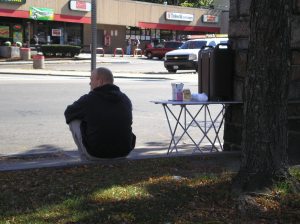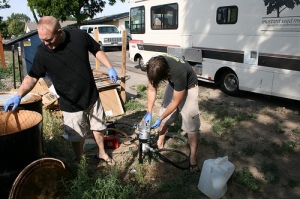 I can't remember exactly when I prayed "the" prayer. Maybe I was three or four, possibly five, my mom probably knows. It doesn't seem that significant now. I remember telling people that my true conversion occurred when I was 19. After the spiritual high wore off, it didn't feel much different and I went on making the same mistakes, questioned what it all meant and struggled with knowing what it meant to "believe" in Jesus. It was / is more of a process than an instantaneous conversion. Today I can say that I am assured of my salvation; I know who I am in Christ. I have heard somewhere that salvation happens instantly, but sanctification is a process. I don't know. Paul said that we must "work out our salvation," so he would probably disagree with the whole "instantaneous" thing.
I can't remember exactly when I prayed "the" prayer. Maybe I was three or four, possibly five, my mom probably knows. It doesn't seem that significant now. I remember telling people that my true conversion occurred when I was 19. After the spiritual high wore off, it didn't feel much different and I went on making the same mistakes, questioned what it all meant and struggled with knowing what it meant to "believe" in Jesus. It was / is more of a process than an instantaneous conversion. Today I can say that I am assured of my salvation; I know who I am in Christ. I have heard somewhere that salvation happens instantly, but sanctification is a process. I don't know. Paul said that we must "work out our salvation," so he would probably disagree with the whole "instantaneous" thing.I have never pushed the whole prayer thing with my own kids. I guess I'm not really willing to pressure or even gently and lovingly persuade my kids into doing something I'm not even sure about. This isn't to say that I don't think proclaiming that you know and love Jesus isn't an important and life altering decision in someone's life, or that parents that have or plan to talk to their kids about "accepting Jesus Christ as their Lord and Savior," are doing something inappropriate. It is just something that I am personally choosing not to pursue with my kids. Something I want them to become curious about and really want to do it, not something I planted or indoctrinated them with. I recall telling campus missionaries that tried to "save" me in college that Christianity was my parent's religion. Maybe that's because I prayed "the" prayer before I knew that I could make it mine, before I knew what it even meant to follow Jesus (which I still don't fully understand).
I think the bigger question here is what does it even mean to be "saved." Theologically, the "work" of salvation has already happened on the cross, but what does it take to be "saved." Should we simply believe? Must we then proclaim what we believe? Is that it? Most mainstream Evangelicals treat salvation like a point of sale transaction. Once you swipe your eternity debit card through the machine and punch in your Jesus PIN number, you are good to go. But I have problems with this definition of salvation. It is obvious to me that it isn't some instantaneous occurrence where a little bell rings in Heaven and half-naked baby angels begin to celebrate. I also believe that shedding this type of view is essential to our understanding of what it means to enter into the Kingdom of God and both know and follow Jesus. The "cost of discipleship" discussed in Luke 14 should tell us that it is more than simply praying.
One of my favorite translations is the New Living Translation. Reading through the New Testament I have noticed that nearly every time the translation uses the word "believers" it has an asterisk. In the footnote it reads "Greek: disciples." I wonder why the translators chose to use "believers" instead? "Disciple" is so much richer in context. To be a believer (someone who knows) has a much different meaning than a disciple (someone who imitates).
In John 8, Jesus is speaking to a crowd of people. Early on, He is speaking directly to the "unbelievers," but then he turns his focus to the "believers":
"Jesus said to the people who believed in him, “You are truly my disciples if you remain faithful to my teachings. And you will know the truth, and the truth will set you free.”It sounds like you can be a "believer" and not be free. Only by following his teachings can you become a disciple and learn the truth, and only then will you be set free.
In Matthew 7, Jesus says that simply calling out to him (praying?) will not automatically mean you will enter the Kingdom of Heaven. You must actually do something (be a disciple):
“Not everyone who calls out to me, ‘Lord! Lord!’ will enter the Kingdom of Heaven. Only those who actually do the will of my Father in heaven will enter." (Matthew 7:21)The question that follows is "what exactly are the 'teachings' of Jesus?"
“Teacher, which is the most important commandment in the law of Moses?” Jesus replied, “‘You must love the Lord your God with all your heart, all your soul, and all your mind.’ This is the first and greatest commandment. A second is equally important: ‘Love your neighbor as yourself.’ (Matthew 22:36-39)And in John, Jesus comes full circle: we must (1) remain faithful to His teachings, (2) His teachings are to love and (3) if we love we prove we are a true disciple:
"Your love for one another will prove to the world that you are my disciples.” (John 13:35)I write all of this not because I have answers, but because I have questions. How can I lead my kids into a deeper and more authentic relationship with Jesus? How can I allow freedom for my children to make their own decisions and be true disciples of Jesus? I think part of the reason I don't want to lead my children through a simple pray and profession of faith is that following Jesus is so much deeper than that. I want my children to be disciples of Jesus, not just believers in Him.
































